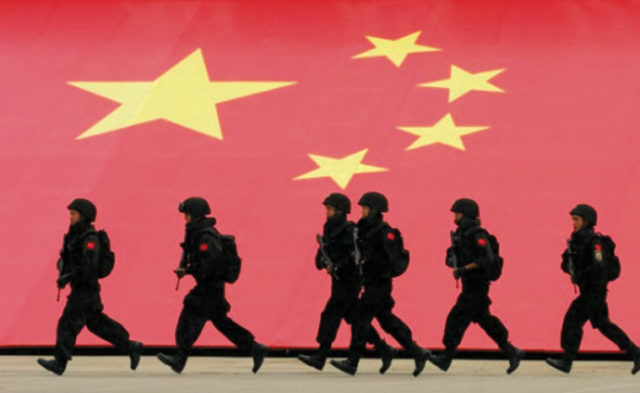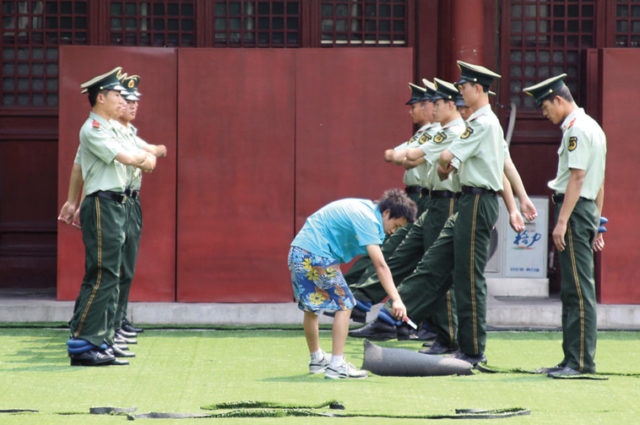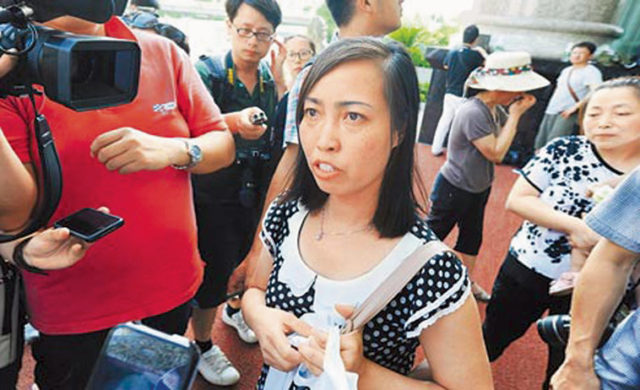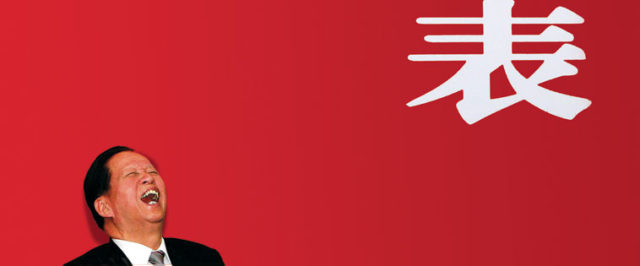
In post-Eighteenth Party Congress China, politics continue to dominate the justice agenda, particularly in corruption cases and in cases that may have an impact on social stability. Despite its staunch opposition to liberalism, the new party leadership recognises that, during the last decade, encroachments of the Stability Maintenance agenda on the legal system have resulted in a widespread loss of public trust in the law. Hence, in 2013 rhetorical expressions such as ‘using rule-of-law thinking’ have reappeared in the politico-legal discourse. This in no way implies a new commitment to liberal values. Indeed, the prescribed route to development and prosperity in Xi Jinping’s China remains unmistakably socialist, intolerant of the ‘deviant path’ of Westernisation and heavily reliant on anti-corruption rhetoric and Mass Line discourse, and these ideological concerns justify and inform justice practices.
Civilising justice has been an ongoing national project in post-Mao China. Officially, it goes under the description of ‘reform’ — an effort to instil the values associated with the rule of law into the practice of justice. Yet in these times of rapid social transformation, the civilising of justice is inseparable from politics. Increasing demands for ideological conformity have an inevitable impact on the way the justice system works both in theory and practice.
Since late 2012, the new party leadership has been realigning its politico-legal agenda. It has been pulling away from the hardline insistence on ‘Stability Maintenance’ (weiwen 维稳, short for weihu shehui wending 维护社会稳定) that was eroding public confidence in the law (and which we discussed in the 2012 Yearbook), and is returning to an emphasis on building the rule of law. Collective public protests or ‘mass incidents’ (qunti shijian 群体事件) drew the particular ire of the party-state in the years after the Seventeenth Party Congress. Over the years 2007 to 2012, these increased from around 80,000 to well over 100,000 annually, possibly up to 180,000. After 2007, and bolstered by a dramatically increased annual budget, police and other security agencies implemented a conservative approach to policing, or what the legal scholar Yu Jianrong describes as ‘rigid Stability Maintenance’ (gangxing weiwen 刚性维稳) operations. State responses to protests began to soften as a result of the Guangdong provincial government’s success in negotiating a peaceful resolution to the stand-off between police and protesters in Wukan village that captured the nation’s attention in December 2011, as discussed in the 2012 Yearbook. The political fallout from the March 2012 downfall of Bo Xilai further turned the tide.
Loss of public trust in the law has been central to the party-state’s decision to revive rhetoric around the rule of law. By mid-2012, it was apparent that the party leadership recognised the futility of rigid Stability Maintenance as a long-term political solution. It began to favour instead the relatively peaceful process of mediating and resolving disputes through local courts and government agencies.
Refining Stability Maintenance
The law–politics nexus in China is well illustrated by the major political events of 2012–2013. This period’s justice-related highlights and lowlights include the dramatic downfall of the Bo Xilai empire in Chongqing, his wife’s murder trial in August 2012 and the associated criminal trial of his right-hand (police-) man Wang Lijun in September 2012. They include other high-profile trials such as that of millionaire businesswoman Wu Ying, who escaped execution apparently as the result of nationwide public demands for leniency, and that of Burmese drug lord Naw Kham, whose final hours before execution March 2013 in Yunnan province were televised nationwide.
Political realignments in late 2012, meanwhile, began to shift politico-legal agendas. As the head of the Central Party Committee Politico-Legal Commission from 2007 to the end of 2012, Zhou Yongkang played a central role in formulating and implementing justice policy, driving the Stability Maintenance agenda from central to local criminal justice agencies, through politico-legal party committees in courts, procuratorates and police stations across the nation. But Zhou’s support for Bo Xilai sealed both his own fate and, indirectly, the fate of rigid Stability Maintenance. With Bo’s downfall, Zhou Yongkang found himself politically isolated. As the political mood shifted, in July 2012 he publicly affirmed the more moderate ‘Guangdong Model’ (that is, a negotiated solution to local strife).
In August, Zhou further tried to salvage his reputation as well as his protégés’ within the bureaucracy by touting what he referred to as a more ‘civilised’ security and justice agenda. This consisted of standardising justice practices throughout the nation and urging strict enforcement of laws and regulations. In January 2013, the well-known activist lawyer Pu Zhiqiang made an extraordinary public attack on Zhou, accusing him of abusing human rights through rigid Stability Maintenance, calling him a ‘traitor to the people’ and characterising his actions as ‘poisonous’. Pu argued that for China to emerge from the shadow of Stability Maintenance, Zhou would have to be ‘held to account’ (qingsuan 清算) for its negative political and social fallout. Although these comments were later deleted from the Chinese Internet, at the time of writing Pu had not suffered serious consequences for his outspokenness. This alone suggests the level of disdain for Zhou in even the highest political circles.
Regaining Trust in the Law
Security agencies deployed three million people including police, other security personnel and volunteers to maintain stability and protect the some 2000 national party delegates who descended on Beijing for the week-long Party Congress beginning on 8 November 2012. This congress set the 2013 politico-legal agenda, announcing new rule-of-law-based slogans and a crucial change in the politico-legal power structure. Until 2012, politico-legal authority was concentrated largely in the person of Zhou Yongkang as Politburo Standing Committee member and head of the Politico-Legal Commission. After November, Xi Jinping and colleagues recentralised this authority back into the collective hands of the Politburo Standing Committee.
Meng Jianzhu, the former Minister of Public Security, became the new head of the Commission in November 2012. Meng’s debut speech implored criminal justice organs to ‘civilise’ their practices, conduct their work ‘on the basis of the rule of law’, and ‘standardise’ justice practices across the nation to ensure that the law is properly enforced. As Meng declared:
… Making use of concepts and methods of the rule of law, we should also enhance, in a practical way, our ability to resolve conflicts and maintain stability … . We should rigorously implement the basic strategies of the rule of law, and conscientiously address the issue of developing our capacity to enforce the law in the context of constructing a socialist country within the framework of the rule of law. Public security organs should tenaciously build up the concepts of socialist rule of law, skilfully handle all kinds of complex problems with the help of rule-of-law thinking, skilfully resolve various social conflicts with the help of legal approaches, and skilfully maintain social order with the aid of law and regulations. This way, solutions to social conflicts and problems can be addressed via the rule of law … . Law enforcement should be performed on the one hand, strictly and justly, and on the other hand, in a rational and civilised manner.
Immediately following important Party Congress speeches, political factions and personalities often test regime tolerance through provocative statements. While some political authorities clung to Stability Maintenance rhetoric, at the other end of the political spectrum others took advantage of the opportunity to promote more robust rule of law values. Writing in the People’s Forum (Renmin luntan 人民论坛), Supreme People’s Court Deputy Chief Justice Jiang Bixin’s endorsement of the virtues of the rule of law went far beyond the modest enforcement-orientated goals of Meng Jianzhu’s speech. Rebuffing those in the Party who ridiculed the idea of ‘universal values’, Jiang lauded the civilising effects of law and justice:
Concepts such as democracy, freedom, equality, rule of law, justice, integrity, and harmony should be incorporated into core socialist values … . These concepts have never been merely patents of the bourgeoisie, but are the product of the civilising process which is commonly created by all human beings. These concepts symbolise both the moral values of humanism which are embedded in the rule of law, and the fundamental conditions upon which the rule of law is conceived. … [T]he inclusion of these concepts into core socialist values will not only enrich the core socialist values system, but will also endow socialist values with a commonality and compatibility with other value systems.
The reignition of rule-of-law rhetoric may point more to a change in the political mood for limited internal reform than the delivery of dramatic improvements to the structure of state power. Yet the upsurge in references by politicians to the rule of law in late 2012 and early 2013 signalled intentions within the Party to make the judicial and security organs more conducive to ‘supervision’ and the ‘mutual restraint’ of authority — a boon, ultimately, for the long-term resilience of the regime. This change of political heart will influence the carriage of justice in courts and policing agencies, many of which in recent years took the stability imperative to extremes.
The ‘localisation’ (difanghua 地方化) of court agendas over the last decade has meant that at each sub-national level (county, municipal, provincial), local party and government officials have been able to interfere with and heavily influence the work of individual judges in politically sensitive and potentially socially destabilising disputes over land, labour and environmental issues. Given that courts and judges rely on local governments for their resources and remuneration, systemic entrenchment of local power relations has often mitigated against judicial fairness in cases with implications for social stability. Hence, rule-of-law statements posit nationwide ‘standardisation’ (guifanhua 规范化) in place of destabilising ‘localisation’.
Promoting the Rule of Law
In January 2013, at a national politico-legal work conference, Meng Jianzhu announced four main areas to be targeted for reform in the coming years: the Re-education Through Labour (RTL) system — the ‘letters and visits’ (xinfang 信访) petitioning system, the balance of power structures within the politico-legal system and the household registration system. These are detailed on the Politico-legal Commission’s new ‘Chinapeace’ (ping’an Zhongguo 平安中国) website, which declares that ‘the core of politico-legal work is located in peace and rule of law’. The Commission recognises that for this to be realised on a local level and in fairer justice practices generally, power relations among and between the police, procuratorates and courts need to be fine-tuned.
The announcement related to RTL reform in January garnered by far the most media attention. As a form of administrative detention that is solely at the discretion of the public security organs, RTL bypasses the judicial system, allowing detention without trial for up to three or four years for prostitutes, petty thieves, those judged to have disrupted social order, people involved in unlawful religious activity and even petitioners. Many scholars have been arguing for years that the RTL system is unconstitutional and should be abolished.
In cutting out the middlemen (the court system as decision-maker and the Ministry of Justice as administrator), RTL gives police great flexibility in dealing with public order misdemeanours and provides a convenient dumping ground for those, like petitioners, who have become a political nuisance to local authorities.
Take the case of Tang Hui. The mother of an underage rape victim, Tang protested outside local government buildings, claiming that police had falsified evidence in order to mitigate the punishment of men who had kidnapped and raped her eleven-year-old daughter, forcing her into prostitution. In August 2012, the police sentenced Tang to eighteen-months detention at a RTL facility in Yongzhou, Hunan province, for ‘seriously disturbing social order and exerting a negative impact on society’. A public outcry helped secure her speedy release. She tried to bring an administrative lawsuit against the RTL committee. In April 2013, the Yongzhou court rejected Tang’s claim for compensation, but in July she won her case on appeal and was compensated 2,941 yuan.
One main reason why RTL was not abandoned years ago is that the politico-legal authorities are yet successfully to rebalance existing horizontal power relations between courts, police and the Ministry of Justice. The public security organs have a vested institutional interest in retaining a system that involves hundreds of facilities, thousands of personnel and substantial budgets. Absence of a viable alternative that suits all institutional players also explains RTL’s continued existence. The courts do not want their workloads increased, and China’s crowded and under-resourced prisons do not need more inmates.
The authorities have begun discussing cost-effective alternatives to RTL for punishing misdemeanours that would not further stress the already overburdened criminal trial system. Many provinces are now opting to reform the system by simply not arresting people for RTL-related misdemeanours or transforming RTL facilities into compulsory drug treatment centres. In 2012, Yunnan, for instance, became one of the first provinces to decide no longer to detain people for three illegal (non-criminal) behaviours including ‘suspected violations of national security’ (shexian weihai guojia anquan 涉嫌危害国家安全), ‘causing a nuisance through petitioning and visits to authorities’ (chanfang naoshi 缠访闹访) and ‘sullying the reputation of national leaders’ (wuru guojia lingxiu 污辱国家领袖). Interestingly, authorities have done their best to avoid public attention and press coverage on the process of RTL abolition.
Criminal Procedure Law and the Mental Health Law
Rebalancing power relations and providing better enforcement mechanisms are the underlying themes of two major legislative reforms realised in 2012: the amendment of the 1996 Criminal Procedure Law and the promulgation of the Mental Health Law. After a decade of intense public discussion, scholarly proposals and negotiations among the various politico-legal powers, the National People’s Congress (NPC) amended the Criminal Procedure Law in March 2012. Despite the insertion of the clause ‘respect and safeguards for human rights’ into the aims of the law, the revised law immediately generated public concern and scepticism.
Debates among scholars and in the media have focused on the clauses concerning the system of ‘residential surveillance’. Article 73 of the new law ensures that the public security authorities maintain their exclusive power to put people suspected of crimes against national security (weihai guojia anquan fanzui 危害国家安全犯罪), terrorism (kongbu huodong fanzui 恐怖活动犯罪) and extremely serious corruption cases (tebie zhongda huilu fanzui 特别重大贿赂犯罪) under house arrest for up to six months in a location at their discretion. Commentators argue that since the definitions of these crimes remain extremely vague, Article 73 could easily justify incommunicado detention of political troublemakers, as has happened in the past.
Another crucial legislative document issued in October 2012 is the Mental Health Law — almost thirty years in the making. Amending the 1996 Criminal Procedure Law and issuing a new Mental Health Law could well improve the protection of the most vulnerable in society. However, as leading Beijing-based specialist in mental health law Guo Zhiyuan has noted, both of these legal areas have become ideological battlefields between those who believe the thrust of the law is to protect society and maintain stability and order, and those who oppose this imperative when it threatens the protection of the rights of the vulnerable.
Protecting the Interests of the ‘Masses’
The rhetoric of the ‘rule of law’ has not by any means supplanted the language of mass-line justice that has been a staple of justice administration since the mid-2000s. Now more than ever, the Party is keen to be seen as responsive to the needs of the masses. This is reflected in law and order rhetoric. For instance, just days before he left for his American tour in June 2013, Xi Jinping spoke at a national conference organised by the Central Party’s Politico-Legal Commission. He highlighted the need to allow the ‘people’s demands for the administration of justice’ (renminde sifa yaoqiu 人民的司法要求), along with the requirements of economic development, to be the guiding force of police work in China. Gone, for now at least, is Zhou Yongkang-style ‘rigid Stability Maintenance’. But the commitment to stability remains: the NPC announced in March 2013 that the budget for ‘stability maintenance’ would increase by 8.7 percent over 2012 to RMB761.1 billion (US$123.7 billion).
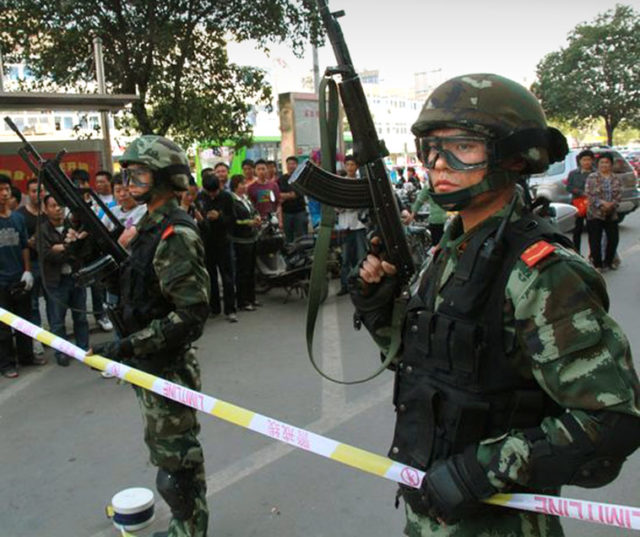
The portrayal of crackdowns on crime encourage the public to appreciate the benefits of a strong and protective state.
Source: ImagineChina
Official media portrayals of crackdowns on crime encourage the public to appreciate the benefits of a strong and protective state. The news gives prominent coverage to such high-profile justice operations as the capture and killing of ‘China’s most dangerous man’, Zhou Kehua, and the capture and execution of Naw Kham, one of the Golden Triangle’s biggest drug lords. ‘Strike Hard’ police operations on 24 May 2012 that ended with mass arrests and the extradition of 126 Chinese citizens from Malaysia and Thailand who were suspected of involvement in international telephone scams perpetrated against Chinese people back home also made the headlines. Less newsworthy, in China, at least, was news of Australians and other foreigners in trouble with the law in China, unless they were involved in crimes against Chinese citizens.
‘Administering justice for the people’ (sifa wei min 司法为民) is very much alive in mediation work, which has dominated the agenda of the courts in recent years. Judicial mediation between the masses and local companies, developers and government in labour, land and environmental disputes has become a politico-legal priority. In February 2012, the Ministry of Justice required judges at lower levels to encourage parties to exhaust all avenues of dispute resolution before proceeding through the trial process, allowing litigation only as a last resort. Mediation is additionally attractive to the central authorities because if complainants agree to the terms of a mediation agreement, they no longer have the right to petition in the capital for redress. But pressure from Beijing on local courts to ‘close the case and solve the problem’ (anjie shiliao 案结事了) before it reaches higher levels of justice administration — or before petitioners head off to Beijing to protest — means courts are now clogged with administrative cases, many of which are difficult to mediate in favour of the complainant. According to some Chinese sources, with the ‘petition-isation’ of court work (sifa xinfanghua 司法信访化), seventy to eighty percent of administrative cases are now required to undergo mediation rather than going straight to trial.
One of the authorities’ most conspicuous moves on behalf of the public interest has been the new anti-corruption drive, as we note elsewhere in this Yearbook. Xi Jinping delivered a major speech in mid-November 2012 predicting an end to the Party if corruption could not be brought under control. Since then, he has argued that the abuse of power can be tackled only through the strengthening of the rule of law, or, as he put it, positioning power ‘within the cage of regulation’. The words are bold. Yet there has been no introduction of the kind of systemic change that would tackle corruption by forcing the Party to take the Constitution more seriously and limiting party power in government decision-making, despite increasing demands for this throughout the blogosphere and in legal and academic circles.
Debating the Constitutional ‘Key Word’
Xiao Yang, Chief Justice of the Supreme People’s Court, presided over a decade of impressive reforms to the court system that ended with his retirement in 2008. He published his memoirs in July 2012 — well before the January 2013 media debates on the need to strengthen the authority of China’s Constitution. The Southern Weekly published a photograph of an exuberant Xiao Yang on its online edition of 6 July 2012 under the provocative headline ‘Xiao Yang’s Collected Works Published, His Keywords are “Reform”, “the Constitution” and “the Rule of Law”’. Xiao argues that there are already provisions in the Constitution that limit the powers of both the Party and institutions, and that these need to be acknowledged, applied and taken as the ‘bottom line’ in any discussion on rule of law and reform.
In January 2013, veteran law expert Jiang Ping declared that China needs no less than an entire paradigm shift from an emphasis on collective public (state) rights to private (individual) rights. In a similar vein, Deputy Chief Justice of the Supreme People’s Court Jiang Bixin observed that it is imperative to accept and internalise values such as democracy, freedom, equality, rule of law, justice, integrity and harmony — observations that go hand in hand with his earlier, even more provocative suggestions in June 2012 about limiting party power. His essay in the June 2012 edition of Theoretical Horizons (Lilun shiye 理论视野) called on the Party to take the Constitution at face value and limit the exercise of party rule exclusively to the National People’s Congress.
As it has been noted in the introduction to this Yearbook, lively discussions around the rule of law, constitutionalism and judicial independence dictated the agendas and inspired discussions in the liberal press and scholarly circles in December 2012 and January 2013. Liberal intellectuals and activists increasingly used the expression ‘constitutional governance’ (xianzheng 宪政) to demand the realisation of the basic rights guaranteed by the Constitution. But Communist Party rhetoric about building rule of law — including a call by Xi Jinping in December 2012 to fully implement the authority of the Constitution — revealed the senior leadership had a far more limited agenda.
The Eighteenth Party Congress Work Report issued in December 2012 stressed the Party’s continued commitment to ‘using legal-system thinking’ to resolve social issues. It also emphasised its intention to improve oversight functions, ‘standardise’ practices and enforce the law. Yet official renunciation of concepts including ‘constitutional governance’ and judicial independence in May 2013, made it clear that any legal reforms, in the short term at least, are unlikely to involve changes to the structure of state power. On 21 May, a week after media exposure of an internally circulated party document warning officials against ‘dangerous’ Western values and other ideological threats, the Party’s Red Flag Journal (Hongqi wengao 红旗文稿) published an article by constitutional scholar Yang Xiaoqing that confirmed a new wave of conservatism. According to Yang, there’s no place for talk of constitutional governance in China, even in the context of socialist constitutional rule. The party-sanctioned piece argued that by its very nature, constitutional governance can only relate to capitalist and bourgeois thought. It therefore cannot fit within the ‘democratic dictatorship of the people’; in China, ‘it would lead to chaos’. The next day, an editorial in the ideologically conservative tabloid Global Times repeated Yang’s argument, adding that constitutional governance was merely an ‘empty political slogan’ espoused by a ‘minority of liberal intellectuals’ in China. The editorial declared that ‘If the entire Western world together cannot muster the might [to change China’s course], then a small group of dissenters will be even less likely to do so’.
Conclusion
‘Reform’, ‘Constitutional Governance’ and ‘Rule of Law’ were the keywords in debates about justice in 2012 and 2013. Underlying all these is the all-important issue of trust. A major problem for the Party’s long-term survival is that it needs the people to trust a judicial system that the Party’s members themselves no longer demonstrably believe in. It needs them to trust a system that has been directly undermined by rampant corruption both in the Party and in the government. Maintaining stability in society and the Party’s continued rule depends upon this strained fiduciary relationship.
The Party needs the people of China to seek to resolve injustices by recourse to judicial institutions rather than protest. But instead of addressing the problem of corruption and injustice through systemic political change, Xi Jinping has launched yet another ‘campaign’ against corruption through the media, propaganda and the Party’s internal discipline and inspection committees, which have egregiously failed for decades now to tackle the issue. Hardline Stability Maintenance is out of fashion. Despite various moves to ‘civilise’ justice, however, the Party and its political agenda still drive the realities of both the law and justice in China today. Xi Jinping may have stated boldly that power should be exercised ‘within the cage of regulation’, but he is some way from taking the advice of Jiang Ping, Xiao Yang, Jiang Bixin and others to make the Constitution the basis of that cage.


